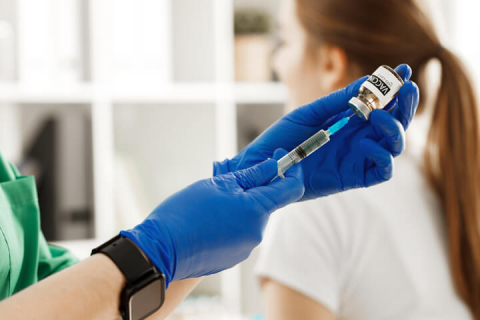One in three people who say they will not be vaccinated against COVID-19 in 2020 have been vaccinated with at least one dose (27 percent) or plan to do so (6 percent). There was an even greater shift among those expressing uncertainty/skepticism about such vaccines in 2020. More than half (57 percent) - have received at least one dose, and one in six (16 percent) plan to get vaccinated. The smallest change occurred among those who said they wanted to be vaccinated in 2020: 79 percent have received at least one dose, and 12 percent plan to do so.
Only 9 percent of respondents changed their attitude toward COVID-19 vaccination to negative.
These data are from the preprint of the paper " Public vaccination reluctance: What makes us change our minds? Results of a longitudinal cohort survey". One of its authors is Wojciech Feleszko, MD, PhD, from MUW.
Where did the idea come from to conduct a study on changing attitudes of Polish people towards COVID-19 vaccination?
Wojciech Feleszko, MD, PhD : Already a year ago, we were interested in the topic of Polish attitudes towards vaccinations. At the time, the talks about a vaccine had just started. We were curious if Polish people would want to take it. The results we received were distributed as follows: about 1/3 decided to vaccinate, 1/3 were undecided, and 1/3 were opposed. All persons participating in the survey at that time were remembered in the database of the research agency ARC Rynek i Opinia and now it is possible to return to them. We were very curious to see if anything had changed in that same group today after another year of pandemic. This was a unique opportunity and we couldn't pass it up. The issue of vaccination and population immunity is hot all the time. We continue to analyze the difference in mortality rates in countries with high and low vaccination rates. And this is more evident in Europe than anywhere else. On the one hand there are Eastern European countries (the further east you go, the worse the vaccination rate), on the other hand there are Western European countries with high vaccination rates and very low mortality rates. So observing what makes people change their attitudes is wildly important. And we believe it will be possible to use this knowledge in strategies aimed at encouraging vaccination.
What caused the change in attitudes toward vaccination? Was it simply a matter of time and observation "Others get vaccinated and nothing bad happens to them, therefore nothing will happen to me either"?
W.F.: The main reason for the change in attitude among those who previously said "I will never get vaccinated" was concern for their health and safety. This was declared by half of the respondents. It is likely that these individuals had some sort of negative experience in their immediate environment-either someone became seriously ill with COVID-19 or even died. And we think this has caused a change in attitude. In contrast, ¼ of the respondents indicated that in their case the change in attitude towards vaccination was influenced by the desire to travel. And this, as you know, is greatly facilitated by the Covid passport. It follows that any restrictions (including those related to travel) for the unvaccinated, however, are a motivating factor.
Attitudes toward vaccination are changing for the better, but it is still not enough for us to achieve population immunity...
W.F.: At the time when we were finalizing the study, 85 percent of fully vaccinated individuals and/or those who had undergone infection were needed to achieve population immunity. We have included a table in our publication that shows what the declarative intention to vaccinate was and what it looks like now. In Poland, 30 percent of people wanted to be vaccinated. Right now we have 53 percent fully vaccinated. But we are still in the tail of Europe. There are countries like Portugal where 88 percent of people are vaccinated, France 77 percent, Ireland 76 percent, Italy 75 percent, Finland 74 percent. In our country, anti-vaccine attitudes, theories doubting the effectiveness of vaccines, or even ridiculing vaccinations are still very common. Fortunately, in the last month, something has changed and we are seeing a favorable trend. But again - at what cost?
The paper entitled "Public vaccination reluctance: what makes us change our minds? Results of a longitudinal cohort survey" was published as a preprint (non-peer-reviewed results) on SSRN platform Link to publication and researchgate.net Link to publication. Its authors are: Paweł Waszkiewicz, MD, PhD, Professor of the University of Warsaw; Piotr Lewulis, PhD (University of Warsaw); Michał Górski, PhD (University of Warsaw); Adam Czarnecki, PhD, from ARC Rynek i Opinia; and Wojciech Feleszko, MD, PhD (MUW).
